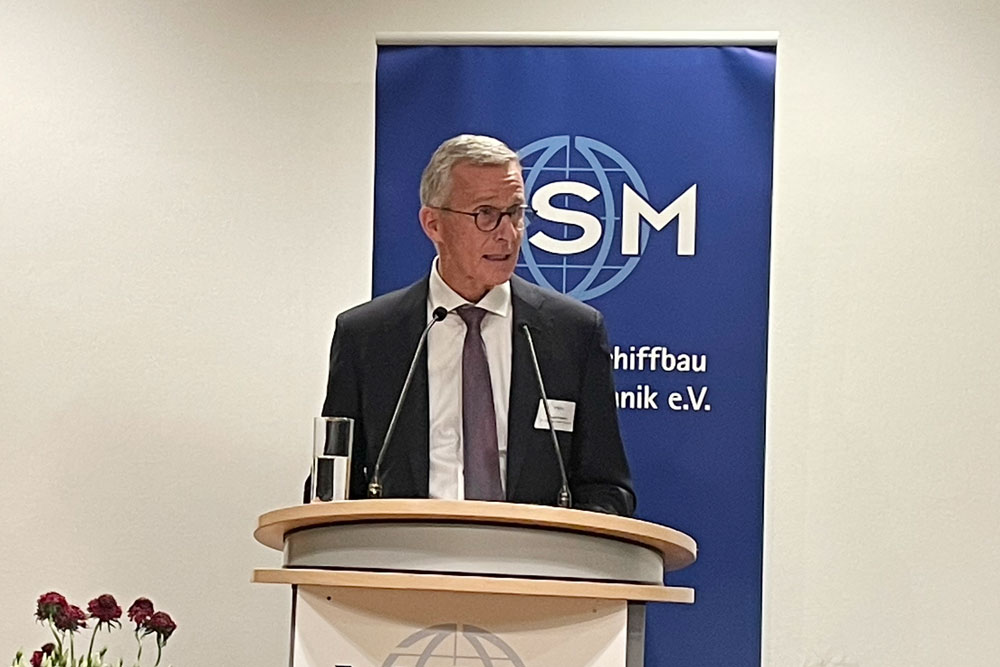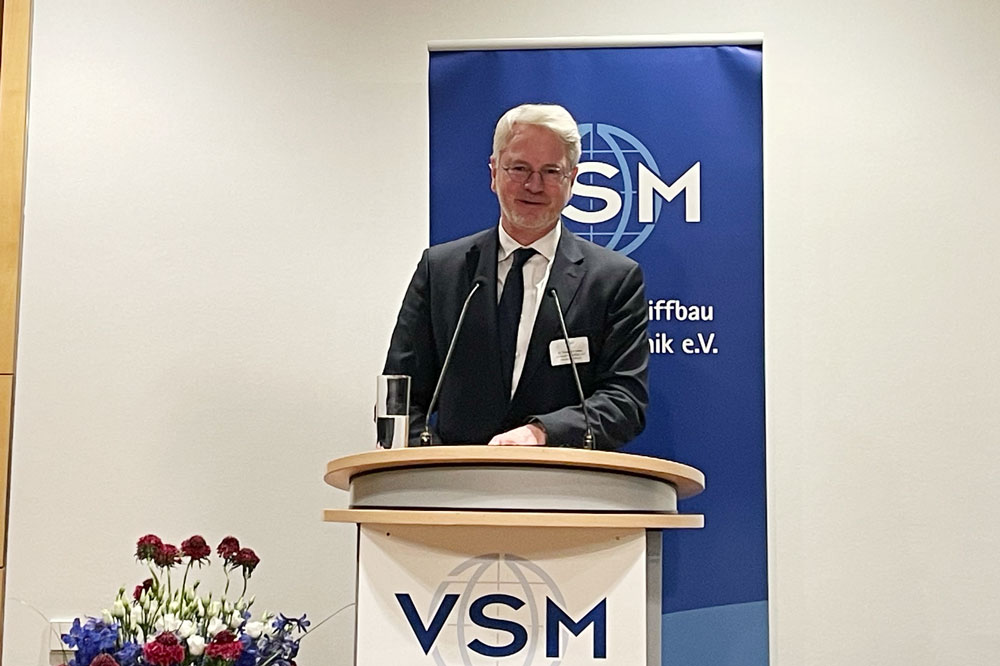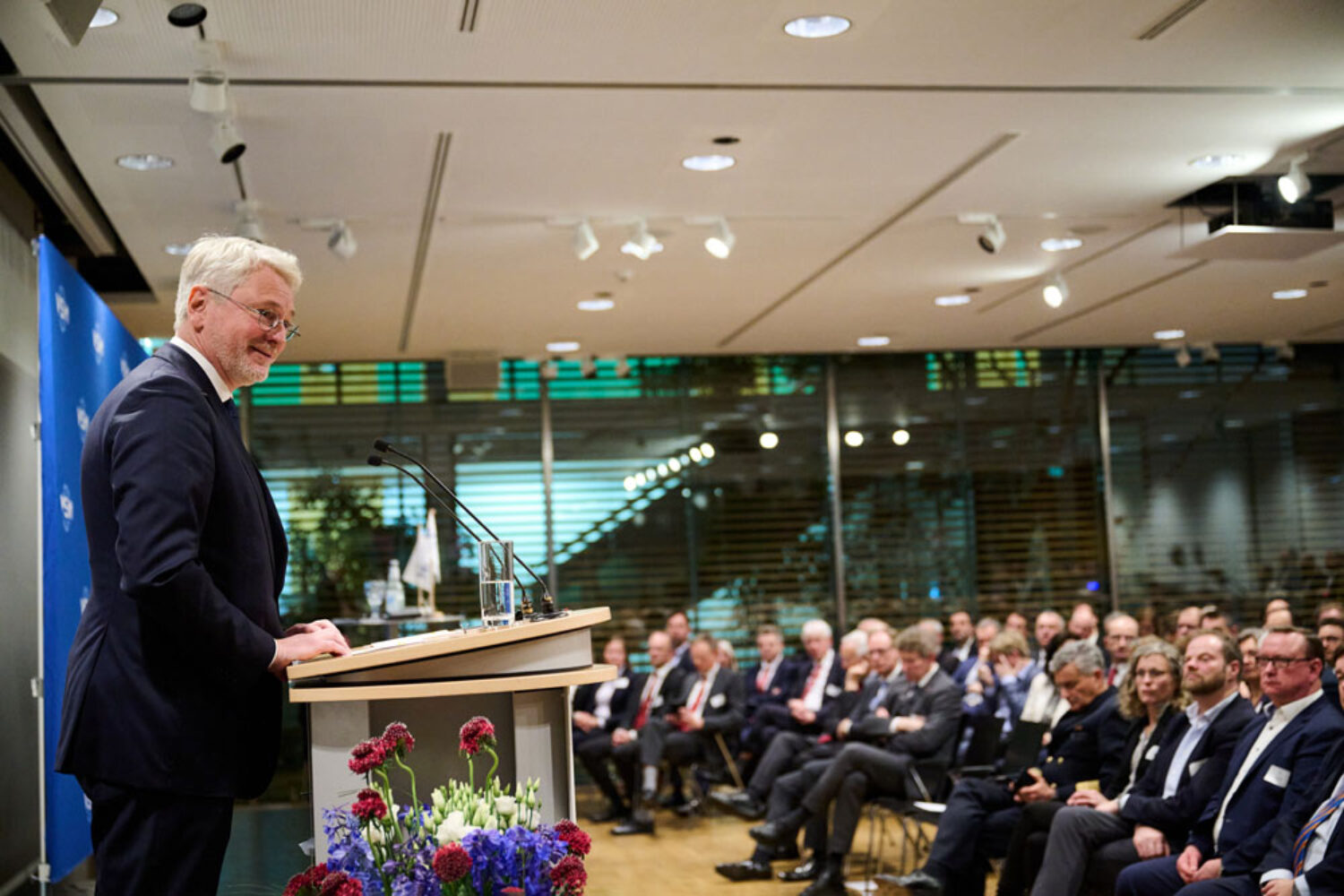Full house, many topics: The VSM’s Parliamentary Evening at the Schleswig-Holstein State Representation in Berlin brought together numerous representatives of the maritime industry.
Around 400 guests accepted the invitation of the Shipbuilding and Marine Technology Association to the capital. The topics were as diverse as the guests. The industry is undergoing a transformation in a dynamically changing environment. The strong influence from Asia, especially China, has changed the maritime industry in Germany and Europe significantly in recent decades. The current political situation is creating additional uncertainty. Political action, particularly at European level, is required here.
Before looking to Europe and the world, VSM President Harald Fassmer summarised the most important events of the past year and gave an overview of the current situation in the German shipbuilding industry.

New orders at record level
“A turbulent year lies behind us, characterised by challenges, but also by pleasing developments,” summarised Harald Fassmer. It has been a busy year for the maritime industry, which continues to operate in a stable economy. The number of new orders was at record levels in almost all ship segments. “But with a Chinese market share of an incredible 70%,” noted the VSM President.
Positive news that the industry can take away from last year are the resolutions passed by the German Bundestag shortly before Christmas. The green light was finally given for the construction of the new research vessel “Polarstern II”, the construction of four submarines and the financing of fundamental design studies for the new F 127. “These decisions were supported by all parliamentary groups. An encouraging signal: despite all the turbulence, we have remained capable of acting and responsible. Many thanks to all members of parliament,” said Fassmer.
No further loss of shipbuilding capacity
Another piece of good news, even if it doesn’t sound like it at first, was the insolvency of the FSG and Nobiskrug shipyards, Fassmer said in his speech. The business practices of the shareholder had long been the subject of head-shaking in the industry. Now, the way is clear for a new start.
“Of course, many questions remain here, including how to deal with suppliers and service providers who provided their services to the companies during the insolvency proceedings,” said Fassmer, hinting at the problems that some of the shipyards’ former business partners are currently having with the insolvency administrator. “We are confident that new investors can be found because Germany cannot afford to do without further shipbuilding capacity,” he continued.
Drama in Papenburg
“And then there was the drama in Papenburg,” said Fassmer, looking back at the turbulence at Meyer Werft last year. “Meyer Werft is one of the biggest success stories in German shipbuilding.” Despite full order books and record demand on the market, this location was suddenly on the brink of collapse.
Much has been written and commented on this. However, everyone in the industry knows what Bernard Meyer and his family have achieved – for the company, for the employees, for Papenburg, for German shipbuilding, for the whole country.
“Anyone who knows Bernard Meyer personally knows how devotedly he has worked for the company and for our industry throughout his life and has received several awards for this. In Finland, the family is showing that great ships are being built under their direction. We are keeping our fingers crossed that they will soon be able to take the helm again in Papenburg,” was Harald Fassmer’s statement on the situation at Meyer Werft, which was followed by loud and long applause.
In order to prevent such situations in the future, the VSM President believes that financing instruments are needed that strengthen and support private entrepreneurship. This is a crucial prerequisite in shipbuilding in particular. If it is not possible to provide shipbuilding with the necessary state financing instruments, German shipyards will no longer be able to sign orders. Instead, they will move abroad.
Threatened by Russia, stifled by China, blackmailed by the USA
Harald Fassmer addressed two further points in his speech. Firstly, he would like to see bureaucracy reduced. The flood of new regulations must be limited, he said. “We need rules, but we also need leeway within which we can move,” said Fassmer.
The second point is a stable government that places greater emphasis on economic interests: “After all, we have to keep our heads above water in the new global political Bermuda Triangle between America, Russia and China – both economically and militarily. We used to be able to rely on Russian energy, growth from China and security from the USA. But today we are threatened by Russia, suffocated by China and blackmailed by the USA. Welcome to the new world,” concludes Harald Fassmer.

Maritime strategy in sight
VSM Managing Director Reinhard Lüken outlined what needs to happen in Germany and Europe in order to survive in the aforementioned Bermuda Triangle and the importance of European shipbuilding worldwide. He began his speech with positive news: there will be a conference on a European maritime strategy. The German government had announced this. It is to take place in May.
“That is a tailwind that we can really use,” said the VSM Managing Director. This maritime strategy is something that is long overdue and for which the VSM has long campaigned at the European level. Last May, for example, there was a decision in which the Council of Ministers called on the Commission to present a maritime strategy. There have been a number of instruments in the past, for example to reduce emissions in shipping. But nothing on topics such as exploiting economic opportunities from this transformation or turning these opportunities into growth. “This is the point that is overdue,” says Lüken.
Europe loses, China benefits
According to the VSM Managing Director, the last approach to a maritime strategy at the European level was in 2013, and even that was only a “tepid rehash”. In terms of shipbuilding – and not shipping – we have had “an absence of policy at European level for over ten years”. The last strategy that really made an impact was in 2003.
Reinhard Lüken then outlined what has happened in the last two decades. In 2003, China had a production of 1.5 million CGT. At that time, Europe had a shipbuilding capacity of 5 million CGT. Almost 20 years later, China has 21.5 million CGT. China has, therefore, gained half a million CGT every year. In the same period, Europe fell from 5 million CGT in 2003 to 1.8 million CGT now. “This is not the result of market developments, nor is it a law of nature, but the result of politics,” explained Reinhard Lüken.
In Europe, we have the longest coastlines and the largest domestic market compared to China and the USA. Lüken could, therefore, not understand why “we Europeans do not have the political will to counter this economic attack by China”. “I am convinced that we will find an answer to this. We have to get back on a growth path.” His wish would be for Europe to get back to where it was two decades ago in ten years’ time.
VSM presents 10-point plan
In his opinion, there is enough to do. There are around 10,000 seagoing vessels and 15,000 inland waterway vessels in Europe. Almost all of them will no longer meet the requirements that will be imposed on shipping in the future. They will either need to be retrofitted or replaced. The German Navy also has a high demand. “We need to invest so that we can become faster. The West has a lot of homework to do.”
The VSM has a clear idea of how the maritime industry can be brought forward. To this end, the association has presented a 10-point plan in which fields of action are formulated for all parties involved. These are aimed at companies, administrations, employees and politicians. The state cannot fix everything, but where the economy cannot do it alone, politics is needed. Small and medium-sized enterprises cannot fight against the long breath from Beijing for long. “Politicians have a duty here,” demands Reinhard Lüken.













